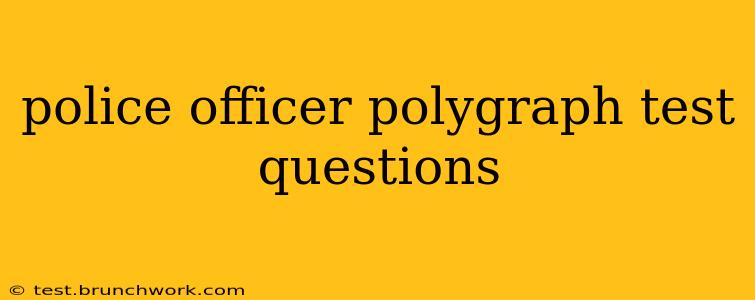The polygraph, often called a "lie detector" test, is a tool sometimes used in law enforcement investigations, including during the background check process for prospective police officers. While its admissibility in court is debated, its use in pre-employment screening remains prevalent. Understanding the types of questions asked during a police officer polygraph test is crucial for both applicants and those already serving. This guide provides insights into the process and what to expect.
Types of Questions Asked During a Police Officer Polygraph Test
Polygraph tests typically employ three types of questions:
1. Irrelevant Questions
These questions are designed to establish a baseline of your physiological responses. Examples include:
- "Is your name [your name]?"
- "Is today Tuesday?"
- "Were you born in [your birth year]?"
These questions are simple and straightforward, helping the examiner assess your typical physiological reactions to truthful answers.
2. Relevant Questions
These are the core questions focusing on the specific areas of the investigation or background check. For police officer applicants, these questions might probe into:
- Criminal History: Have you ever committed a crime, even a minor one, for which you were not arrested or charged?
- Drug Use: Have you ever used illegal drugs, even experimentally?
- Financial Misconduct: Have you ever been involved in any fraudulent activities or financial misrepresentation?
- Honesty and Integrity: Have you ever lied to obtain a benefit or advantage?
- Past Employment: Have you ever been fired or dismissed from a job? Were you ever asked to leave a job?
- Association with Criminal Elements: Do you have any associations with known criminals or gangs?
- Bias and Discrimination: Do you harbor any prejudices or biases that could compromise your ability to perform your duties impartially?
The specific relevant questions will vary depending on the individual case and the agency conducting the test. The examiner will tailor the questions to address specific concerns based on your application and background check.
3. Control Questions
These questions are designed to gauge your responsiveness to deception. They are generally broader than relevant questions and often address behaviors that most people would find uncomfortable to admit. Examples include:
- "Before the age of 21, did you ever do something you know was wrong?"
- "Have you ever lied to avoid getting into trouble?"
These questions help the examiner compare your physiological responses to the relevant questions. A stronger reaction to a control question compared to a relevant question may suggest deception on the relevant question (though this interpretation remains controversial).
Preparing for a Police Officer Polygraph Test
Preparing for a polygraph test involves a multi-faceted approach that focuses on both mental and physical aspects:
- Understand the Process: Familiarize yourself with the types of questions you might be asked. This knowledge helps reduce anxiety and allows you to mentally rehearse your responses.
- Be Honest and Open: The best approach is to answer truthfully and openly. Attempting to deceive the polygraph is likely to be counterproductive.
- Get Sufficient Sleep: Being well-rested is crucial for maintaining composure and providing consistent physiological responses.
- Dress Comfortably: Wear comfortable clothing that allows for free movement and proper sensor placement.
- Stay Hydrated: Drink plenty of water, but avoid excessive caffeine or alcohol before the test.
- Consult with Legal Counsel: If you have concerns about the test or any specific questions, seeking advice from a legal professional specializing in polygraph testing is recommended.
The Limitations of Polygraph Tests
It's crucial to acknowledge the limitations of polygraph tests. They are not foolproof lie detectors and their accuracy is a subject of ongoing debate among legal and scientific experts. The results are not always admissible in court, and they are not universally accepted as conclusive evidence.
This guide provides general information. The specific questions and procedures used in a police officer polygraph test may vary based on jurisdiction and specific circumstances. Always seek professional legal advice if you have concerns about a polygraph test.
